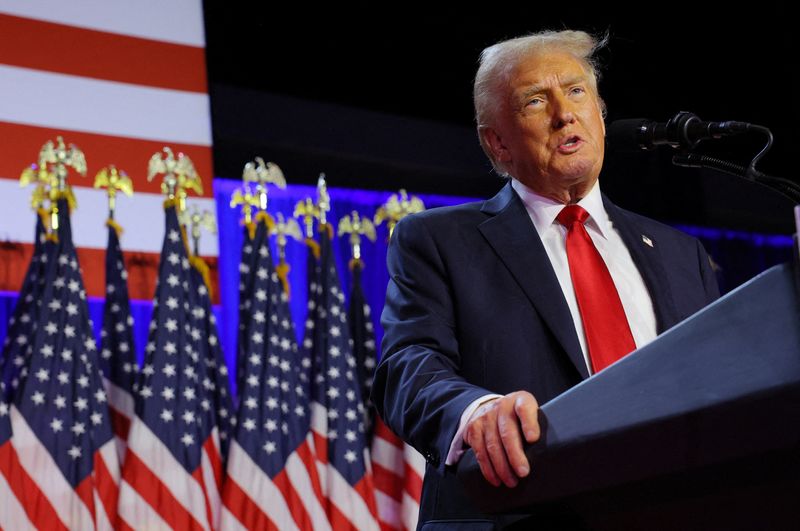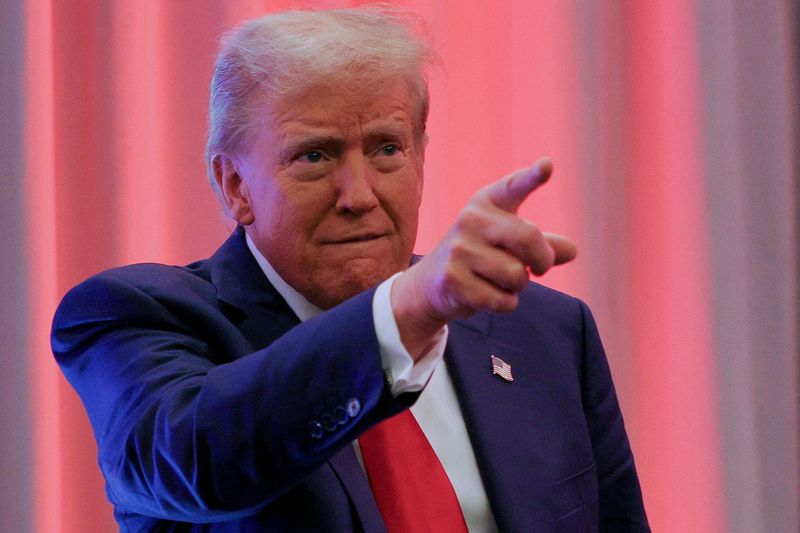By David Shepardson, Rachael Levy and Chris Kirkham
WASHINGTON (Reuters) -President-elect Donald Trump's incoming administration plans to target federal regulations championed by President Joe Biden that aim to make automobiles more fuel-efficient and incentivize a shift toward electric vehicles, according to two sources in contact with Trump's transition team.
The move appears aimed at satisfying a Trump campaign promise to "end the EV mandate," and would mirror a similar move during the first Trump administration to dismantle Obama-era vehicle-efficiency rules.
Although no such "EV mandate" exists, the Biden administration regulations would effectively require automakers to shift at least 35% of production to EVs in order to meet 2032 requirements, and encourage a gradual phase-out of the production of vehicles that run on fossil fuels.
The incoming administration plans to weaken standards on fuel-efficiency requirements and tailpipe emissions finalized earlier this year by the U.S. National Highway Traffic Safety Administration and the Environmental Protection Agency, according to the sources. One of the sources said Trump is expected to formally direct those agencies to reconsider the Biden regulations.
The effort would run counter to the interests of EV maker Tesla Inc (NASDAQ:TSLA), run by Trump backer Elon Musk, which profits from selling regulatory credits to traditional automakers who cannot comply with stricter vehicle emissions regulations.
The Trump transition team did not respond to a request for comment.
The move to undo Biden's vehicle-efficiency rules was first reported by Bloomberg.
Last week, Reuters exclusively reported that Trump's transition team is planning to kill the $7,500 consumer tax credit for electric-vehicle purchases - another move that would likely slow an already stalling U.S. EV transition.
During the first Trump administration, it took nearly three years to overturn similar Obama-era regulations. After Trump called for a review of the rules in early 2017, NHTSA and the EPA began the formal process of rewriting the rules in 2018. It took until March 2020 for both agencies to finalize less-stringent rules.
One of the sources said the move is designed to appease automakers who have complained the Biden regulations are too onerous.
The fuel economy and vehicle emissions standards finalized by the Biden administration this year were significantly less stringent than originally proposed, after automakers lobbied for revisions.
General Motors (NYSE:GM), Ford, Stellantis (NYSE:STLA), Tesla and the Alliance for Automotive Innovation, a trade group representing most major automakers except Tesla, did not respond to requests for comment.
After Trump's first election victory in 2016, automakers pushed to ease the Obama-era rules, arguing they were too expensive and would hamper American job growth. The calculus is different now, said Seth Goldstein, a Morningstar Research Services analyst, as Detroit automakers "have been investing heavily" in EVs.
"They're a lot more advanced in their strategy," he said.
The move to target vehicle-efficiency standards could be a blow to Tesla, which has earned billions of dollars in recent years by selling credits to other automakers who cannot comply with federal vehicle standards and other emissions regulations in U.S. states and other markets around the world.
Because Tesla sells only electric vehicles, it overcomplies with the regulations and generates credits it can sell to others. By loosening the standards, those credits become less valuable.
Tesla CEO Musk was one of Trump's biggest backers and has become an influential adviser since the election.
During the Biden administration, Tesla pushed for far stricter vehicle emissions regulations than what the EPA ultimately passed.

Goldstein, the Morningstar analyst, said he expects Tesla will still be able to profit from selling credits to automakers who need to comply with stricter emissions rules in states like California, and in the European Union.
He said selling credits was "far more important" to Tesla's business model before the company was profitable. Now, he said, the credits are "nice to have," but no longer essential for the company to "generate profits and generate positive free cash flow."
